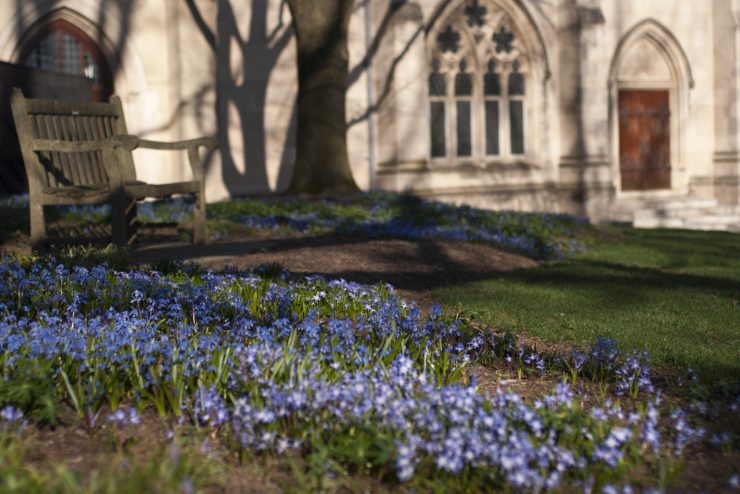Today I Will Follow

Luke 9:18-25
Once when Jesus was praying alone, with only the disciples near him, he asked them, ‘Who do the crowds say that I am?’ They answered, ‘John the Baptist; but others, Elijah; and still others, that one of the ancient prophets has arisen.’ He said to them, ‘But who do you say that I am?’ Peter answered, ‘The Messiah of God.’
He sternly ordered and commanded them not to tell anyone, saying, ‘The Son of Man must undergo great suffering, and be rejected by the elders, chief priests, and scribes, and be killed, and on the third day be raised.’
Then he said to them all, ‘If any want to become my followers, let them deny themselves and take up their cross daily and follow me. For those who want to save their life will lose it, and those who lose their life for my sake will save it. What does it profit them if they gain the whole world, but lose or forfeit themselves?
Ash Wednesday is our yearly come-to-Jesus moment. It’s a chance to recognize our sinfulness, our frailty, and our utter dependence on God. It’s when we commit ourselves for the next 40 days to following in Jesus’ footsteps and living a cross-shaped life. It’s a day of earnestness and dedication, naming before God how we intend to honor these forty days either through removing a barrier that stands between us and God or by taking on a discipline to reshape our lives and bring us closer to the Holy One.
Our scripture for this morning is truly a come-to-Jesus moment for the disciples. Jesus asks them who do people say that he is, and more specifically, who do they say that he is. Peter confesses correctly that Jesus is the Messiah, but Jesus cautions them about what it means to proclaim that confession.
They are not following a champion. As we see on Palm Sunday, Jesus doesn’t come triumphantly into the city riding on a noble steed. No, he comes humbly on a donkey—a beast of work and burden. He is not a military savior ushering in war and violence to overthrow the ruling powers. No, he is a crucified savior who takes the pain of the world into himself and transforms it.
And Jesus asks us to follow him. His words, “‘If any want to become my followers, let them deny themselves and take up their cross and follow me” are found in one form or another in the three synoptic gospels, Matthew, Mark and Luke. We hear his words today from Luke, and there is one additional word in Luke’s version. Did you catch it?
The word is daily. ‘If any want to become my followers, let them deny themselves and take up their cross daily and follow me.” And oh, that one little word makes such a big difference.
Thinking about denying myself and carrying a cross for the rest of my life sounds overwhelming and something that I will surely fail at. But daily, I can do daily.
Today, I can deny myself and carry the cross. I’m almost guaranteed to mess up, to slip and fall. To indulge rather than deny. But it’s not a zero-sum game. If I mess up today, I can start again tomorrow and tomorrow and tomorrow. And just like with any training, I will get stronger each day that I engage.
Here at the beginning of Lent, it’s easy to be filled with commitment for facing these forty days. But for most of us, somewhere in the middle of this time our zeal lags, and what was easy becomes a slog, or even forgotten.
So rather than thinking if we slip up in our efforts this season we should just give up, take the daily approach. Today I can follow Jesus. Today I can deny myself. Today I can find ways to draw close to God. Today I can show God’s love, justice, and mercy in a hurting a broken world.
In closing, I want to leave you with these words from Franciscan friar, Richard Rohr:
“Those who agree to carry and love what God loves, both the good and the bad, and to pay the price for its reconciliation within themselves—these are the followers of Jesus Christ. They are the leaven, the salt, the remnant, the mustard seed that God uses to transform the world. The cross, then, is a very dramatic image of what it takes to be usable for God. It does not mean you are going to heaven and others are not; rather, it means you have already entered heaven and thus can see things in a transcendent, whole, and healing way now.”
Friends, you are invited to take up your cross, today, and follow Jesus for the healing of the world. Amen.
prayer
Disturb us, Lord, when
We are too well pleased with ourselves,
When our dreams have come true
Because we have dreamed too little,
When we arrived safely
Because we sailed too close to the shore.
Disturb us, Lord, when
With the abundance of things we possess
We have lost our thirst
For the waters of life;
Having fallen in love with life,
We have ceased to dream of eternity
And in our efforts to build a new earth,
We have allowed our vision
Of the new Heaven to dim.
Disturb us, Lord, to dare more boldly,
To venture on wider seas
Where storms will show your mastery;
Where losing sight of land,
We shall find the stars.
We ask You to push back
The horizons of our hopes;
And to push into the future
In strength, courage, hope, and love.
—Attributed to Sir Francis Drake, c. 1577
Daily Lenten meditations each have a companion morning prayer video offered by the same clergy. View the YouTube playlist to find this meditation’s companion video, or to watch others.